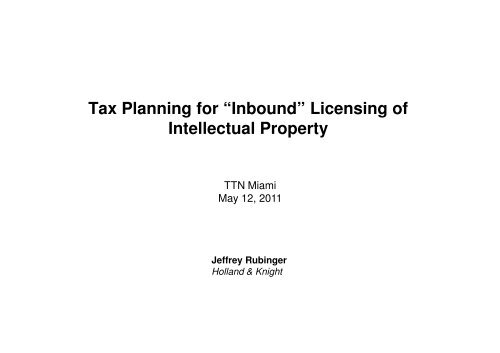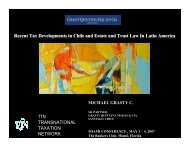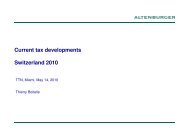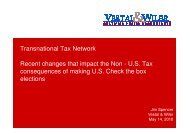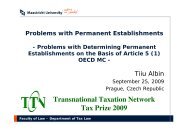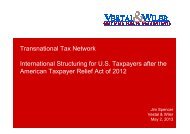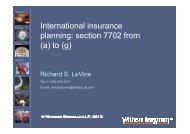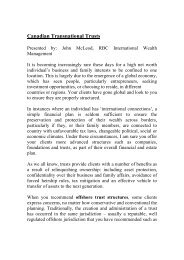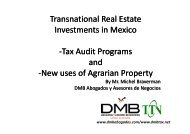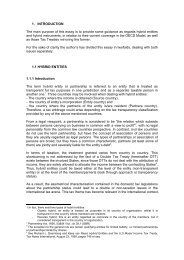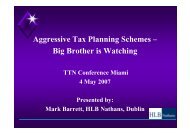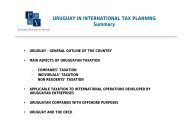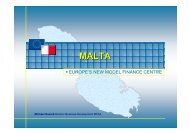Tax Planning for âInboundâ Licensing of Intellectual Property
Tax Planning for âInboundâ Licensing of Intellectual Property
Tax Planning for âInboundâ Licensing of Intellectual Property
You also want an ePaper? Increase the reach of your titles
YUMPU automatically turns print PDFs into web optimized ePapers that Google loves.
<strong>Tax</strong> <strong>Planning</strong> <strong>for</strong> “Inbound” <strong>Licensing</strong> <strong>of</strong><br />
<strong>Intellectual</strong> <strong>Property</strong><br />
TTN Miami<br />
May 12, 2011<br />
Jeffrey Rubinger<br />
Holland & Knight
U.S. Inbound <strong>Intellectual</strong> <strong>Property</strong><br />
Transactions<br />
– Typical Features<br />
• FCo. “licenses” IP to USCo. on an exclusive and worldwide<br />
basis (or <strong>for</strong> a particular territory) in exchange <strong>for</strong> cash in the<br />
<strong>for</strong>m <strong>of</strong>:<br />
– down payment at closing<br />
– regulatory milestone payments<br />
– royalty payments<br />
– sales milestone payments<br />
• Sale <strong>for</strong> a fixed payment is not a typical way to transfer IP --<br />
owner can usually maximize value by making payments<br />
contingent on the level <strong>of</strong> exploitation/use <strong>of</strong> the property<br />
• Agreement labeled “assignment” may be a license <strong>for</strong> tax<br />
purposes, and vice versa, depending on whether all<br />
substantial and valuable rights in the IP have been<br />
transferred <strong>for</strong> the legal life <strong>of</strong> the IP<br />
2
Key Aspects <strong>of</strong> U.S. Federal <strong>Tax</strong><br />
Scheme<br />
– 30% gross withholding at source on FDAP, including “royalties”<br />
• 30% rate may be reduced by treaties – many provide <strong>for</strong> 0%<br />
– 30% gross withholding on gain element <strong>of</strong> U.S. source<br />
contingent payment sales <strong>of</strong> IP (§871(a)(1)(D)/§881(a)(4))<br />
• Contingent payments sourced under “place <strong>of</strong> use” rule <strong>for</strong> royalties<br />
• But fixed payments in a “sale” are sourced under general “residence<br />
<strong>of</strong> the seller” rule<br />
• Contingent payments subject to §871(a)(1)(D)/881(a)(4) are<br />
generally treated as “royalties” <strong>for</strong> treaty purposes<br />
– 30% withholding never applies to fixed payment sales <strong>of</strong> IP, but<br />
if “effectively connected” with conduct <strong>of</strong> U.S. trade or business,<br />
income taxed on a net basis (§871(b)/§882)<br />
3
U.S. Inbound <strong>Intellectual</strong> <strong>Property</strong><br />
Transactions<br />
– Key Characterization Issues<br />
• Sale vs. license ?<br />
• If sale – portion <strong>of</strong> payments considered<br />
“contingent on the productivity, use or disposition”<br />
<strong>of</strong> property ?<br />
• If license – “place <strong>of</strong> use” <strong>of</strong> IP ?<br />
• Permanent establishment ?<br />
4
Treaty Issues and Opportunities<br />
• As noted earlier, U.S.-source royalties are<br />
generally subject to 30 percent withholding tax.<br />
• Most modern U.S. income tax treaties<br />
substantially reduce or eliminate the U.S.<br />
withholding tax on royalties.<br />
• To qualify <strong>for</strong> treaty benefits, <strong>for</strong>eign person<br />
needs to be (i) resident <strong>of</strong> treaty jurisdiction, (ii)<br />
needs to satisfy limitation on benefits (LOB)<br />
provision, if any, contained in treaty, and (iii)<br />
needs to qualify <strong>for</strong> treaty benefits under Section<br />
894, if applicable.<br />
5
Resident and LOB Provisions<br />
• A <strong>for</strong>eign person generally will be considered a resident <strong>for</strong> treaty<br />
purposes if such person is "liable to tax therein by reason <strong>of</strong> its<br />
domicile, residence, citizenship, place <strong>of</strong> management, place <strong>of</strong><br />
incorporation, or any other criterion <strong>of</strong> a similar nature.”<br />
• Under most "modern" income tax treaties, a corporate resident <strong>of</strong> a<br />
treaty country can satisfy the LOB provision if, among other things,<br />
(1) on at least half the days <strong>of</strong> the tax year at least 50% <strong>of</strong> each<br />
class <strong>of</strong> shares in the corporation is owned, directly or indirectly, by<br />
residents <strong>of</strong> the jurisdiction where the corporation is <strong>for</strong>med (the<br />
"ownership test"), and (2) not more than 50% <strong>of</strong> the gross income <strong>of</strong><br />
the <strong>for</strong>eign corporation is paid or accrued, in the <strong>for</strong>m <strong>of</strong> deductible<br />
payments, to persons who are residents <strong>of</strong> the U.S. or residents <strong>of</strong><br />
the jurisdiction where the corporation is <strong>for</strong>med (the "base erosion"<br />
test).<br />
6
Section 894 and Payments to<br />
Hybrid Entities<br />
• Regulation Section 1.894-1(d) denies treaty<br />
benefits on payments <strong>of</strong> FDAP income to <strong>for</strong>eign<br />
persons unless the income is “derived” by a<br />
resident <strong>of</strong> a treaty jurisdiction.<br />
• For this purpose, an item <strong>of</strong> income paid to an<br />
entity will be considered derived by the entity<br />
only if the entity is not fiscally transparent under<br />
the laws <strong>of</strong> the entity’s jurisdiction with respect to<br />
the item <strong>of</strong> income.<br />
7
Section 894 and Payments to<br />
Hybrid Entities (cont.)<br />
Treaty benefits denied because royalty not derived by Lux Co.<br />
Treaty benefits allowed, even through Lux Co disregarded <strong>for</strong> U.S. tax<br />
Purposes, because royalty derived by Lux Co <strong>for</strong> Section 894 purposes.<br />
Luxembourg<br />
Company<br />
Cayman<br />
Company<br />
dividend<br />
hybrid instrument<br />
Cayman<br />
Company<br />
Luxembourg<br />
Company<br />
royalty<br />
license<br />
royalty<br />
license<br />
United<br />
States<br />
United<br />
States<br />
8
Treaties without LOB Provisions that Substantially<br />
Reduce or Eliminate U.S. Withholding <strong>Tax</strong> on<br />
Royalties<br />
• Norway – 0 percent withholding tax on royalties<br />
• Greece – 0 percent withholding tax on royalties<br />
• Pakistan – 0 percent withholding on royalties<br />
• Poland – 10 percent withholding tax on royalties<br />
• Morocco – 10 percent withholding tax on<br />
royalties<br />
• Romania – 15 percent withholding tax on<br />
royalties<br />
9
Favorable Treaty Jurisdictions to Hold <strong>Intellectual</strong><br />
<strong>Property</strong> from U.S. Treaty Perspective<br />
• Luxembourg – 0 percent withholding under U.S. income tax treaty;<br />
low corporate tax rate on royalties; LOB provision less restrictive<br />
than newer treaties as Luxembourg company can be owned by<br />
residents <strong>of</strong> the U.S. or Luxembourg under ownership/base erosion<br />
test; LOB provision has derivative benefits article; however, treaty<br />
has anti-triangular provision <strong>for</strong> royalties allocated to low-tax third<br />
country branch.<br />
• Netherlands – Same as Luxembourg<br />
• Ireland – Same as Luxembourg<br />
• Switzerland - 0 percent withholding under U.S. income tax treaty;<br />
low corporate tax rate <strong>for</strong> royalties; LOB provision requires Swiss<br />
company generally to be owned by Swiss residents (as opposed to<br />
U.S. or Swiss residents) although LOB provision does has derivative<br />
benefits article; treaty has anti-triangular provision <strong>for</strong> royalties<br />
allocated to low-tax third country branch.<br />
• Belgium – Same as Switzerland.<br />
10
Conduit Financing Issues<br />
• If cannot obtain low corporate tax rate on royalties<br />
received in <strong>for</strong>eign jurisdiction, would back-to-back<br />
license arrangement work?<br />
• Prior to the enactment <strong>of</strong> Section 7701(l), the IRS<br />
typically would challenge a back-to-back license<br />
arrangement under Aiken Industries, Inc., or Rev. Rul.<br />
80-362.<br />
• In Aiken, the Service successfully argued that a<br />
Honduran corporation, while a valid resident under the<br />
U.S.-Honduras treaty, had no "dominion and control"<br />
over the funds and was a mere collection agent or<br />
"conduit <strong>for</strong> the passage <strong>of</strong> interest payments" from the<br />
U.S. entity to the Bahamian entity.<br />
11
Conduit Financing Issues (cont.)<br />
• In Rev. Rul. 80-362, a resident <strong>of</strong> a non-treaty<br />
jurisdiction licensed a patent to a Dutch corporation,<br />
which in turn sublicensed the patent to a U.S.<br />
corporation <strong>for</strong> use in the U.S. The royalties paid from<br />
the U.S. to the Netherlands were exempt from<br />
withholding tax under the Netherlands-U.S. income tax<br />
treaty. The IRS ruled, however, that the royalties paid<br />
from the Netherlands to the non-treaty jurisdiction were<br />
U.S.-source royalties under Section 861(a)(4) because<br />
they were paid in consideration <strong>for</strong> the privilege <strong>of</strong> using<br />
a patent in the U.S. There<strong>for</strong>e, those royalties were<br />
subject to a 30% withholding tax in the U.S.<br />
• But see SDI Netherlands where different result reached.<br />
12
Conduit Financing Issues (cont.)<br />
• Conduit financing regulations under Treas. Reg. Section 1.881-3<br />
allows the IRS to disregard the participation <strong>of</strong> one or more<br />
intermediate entities in a financing arrangement where such entities<br />
are acting as conduit entities, and to recharacterize the financing<br />
arrangement as a transaction directly between the remaining parties<br />
to the financing arrangement <strong>for</strong> purposes <strong>of</strong> imposing tax under<br />
Sections 871, 881, 1441, and 1442.<br />
• For this purpose, a financing arrangement is defined as a series <strong>of</strong><br />
financing transactions by which one person (the financing entity)<br />
advances money or other property, or grants rights to use property,<br />
and another person (the financed entity) receives money or other<br />
property, or rights to use property, if the advance and receipt are<br />
effected through one or more other persons (intermediate entities).<br />
13
Conduit Financing Issues (cont.)<br />
• A "financing transaction" means (1) debt, (2) any lease or license, or<br />
(3) any other transaction (including an interest in a trust described in<br />
Sections 671 through 679) pursuant to which a person makes an<br />
advance <strong>of</strong> money or other property or grants rights to use property<br />
to a transferee who is obligated to repay or return a substantial<br />
portion <strong>of</strong> the money or other property advanced, or the equivalent<br />
in value.<br />
• If the IRS determines that the participation <strong>of</strong> a conduit entity in a<br />
financing arrangement should be disregarded, the financing<br />
arrangement is recharacterized as a transaction directly between the<br />
remaining parties to the financing arrangement (in most cases, the<br />
financed entity and the financing entity) <strong>for</strong> purposes <strong>of</strong> Section 881.<br />
14
Conduit Financing (cont). - Examples<br />
Conduit financing regulations would deny treaty benefits<br />
Cayman<br />
Company<br />
Conduit financing regulations would deny portfolio interest<br />
exception because bank would not qualify if loan<br />
made directly to United States<br />
loan<br />
royalties<br />
(assumed<br />
non-U.S. source<br />
income)<br />
Dutch<br />
Company<br />
license<br />
Unrelated<br />
Foreign<br />
Corporation<br />
interest<br />
Unrelated<br />
Bank<br />
royalties<br />
United<br />
States<br />
sublicense<br />
loan<br />
United<br />
States<br />
portfolio<br />
interest<br />
Related party transaction<br />
Unrelated party transaction<br />
15
Conduit Financing Issues (cont.)<br />
• If cannot use back-to-back license arrangements to avoid U.S. withholding tax, what about using<br />
disregarded entities to avoid the second payment <strong>for</strong> U.S. federal income tax purposes?<br />
• Is this a “back-to-back” license arrangement if Dutch company disregarded <strong>for</strong> U.S. tax purposes?<br />
• Section 894(c) regulations would allow treaty benefits, even though Dutch company is<br />
disregarded <strong>for</strong> U.S. tax purposes.<br />
U.S.<br />
Sub-licensee<br />
Cayman<br />
Company<br />
license<br />
license<br />
royalties<br />
royalties<br />
Netherlands<br />
Company<br />
16
Conduit Financing Issues (cont.)<br />
•Prop. Reg. Section 1.881-3(a)(1)(i)(C) contains a provision that indicates that<br />
"the term person includes a business entity that is disregarded as an entity<br />
separate from its single member owner under §§301.7701-1 through 301-7701-<br />
3.”<br />
•As a result, any transaction that the disregarded entity enters into will be taken<br />
into account <strong>for</strong> purposes <strong>of</strong> determining whether a conduit financing<br />
arrangement exists.<br />
sub-license<br />
U.S.<br />
Sub-licensee<br />
Netherlands<br />
Company<br />
license<br />
royalties<br />
Cayman<br />
Company<br />
royalties<br />
17
Use <strong>of</strong> Low-<strong>Tax</strong> Permanent<br />
Establishments<br />
• While the Proposed Regulations are clearly designed to<br />
shut down conduit financing arrangements involving<br />
hybrid entities (i.e., entities that are fiscally transparent<br />
<strong>for</strong> U.S. tax purposes but are not fiscally transparent <strong>for</strong><br />
<strong>for</strong>eign tax purposes), the Proposed Regulations do not<br />
prevent taxpayers from obtaining treaty benefits when a<br />
non-hybrid branch is used.<br />
• This is because the Proposed Regulations specifically<br />
indicate that only entities that are disregarded under the<br />
check-the-box Regulations are treated as persons <strong>for</strong><br />
purposes <strong>of</strong> determining whether a conduit financing<br />
arrangement exists.<br />
18
Use <strong>of</strong> Low-<strong>Tax</strong> Permanent<br />
Establishments (cont.)<br />
There<strong>for</strong>e, it may be possible to use treaty jurisdiction without an anti<br />
triangular provision and allocate royalties to low-tax third country<br />
branch (instead <strong>of</strong> using back-to-back license arrangement).<br />
U.S.<br />
Licensee<br />
Norwegian<br />
Company<br />
U.S.<br />
Licensee<br />
Polish<br />
Company<br />
license<br />
license<br />
royalties<br />
Maltese<br />
Branch<br />
royalties<br />
Irish<br />
Passive<br />
Investment<br />
Branch<br />
U.S.-Norway treaty has no LOB provision<br />
0 withholding tax on royalties<br />
No anti-triangular provision<br />
Norway-Malta treaty exempts royalties from tax in Norway<br />
No tax in Malta as considered <strong>for</strong>eign-source income<br />
U.S.-Poland treaty has no LOB provision<br />
10% withholding tax on royalties<br />
No anti-triangular provision<br />
Poland-Irish treaty exempts royalties from tax in Poland<br />
No tax in Ireland if royalties treated as passive income<br />
19
Hybrid Instruments<br />
• If low-tax third country branch cannot be utilized to reduce corporate<br />
tax rate in treaty jurisdiction, consider using hybrid instrument (e.g.,<br />
CPECs, which are treated as equity <strong>for</strong> U.S. tax purposes but debt<br />
<strong>for</strong> <strong>for</strong>eign tax purposes) to avoid conduit financing regulations.<br />
• However, preamble to proposed conduit financing regulations<br />
issued in December <strong>of</strong> 2008 indicates that Treasury and IRS were<br />
considering issuing separate guidance on the treatment <strong>of</strong> hybrid<br />
instruments under these regulations.<br />
• One approach would be to treat all transactions involving hybrid<br />
instruments as “financing transactions.”<br />
• Another possible approach, according to the preamble, is to add<br />
additional factors to consider in determining when stock in a<br />
corporation (or other similar interest in a partnership or trust) may<br />
constitute a financing transaction.<br />
20
Hybrid Instruments (cont.)<br />
Cayman<br />
Company<br />
interest <strong>for</strong> Lux tax purposes<br />
dividend <strong>for</strong> U.S. tax purposes<br />
CPEC (convertible preferred equity certificates)<br />
Luxembourg<br />
royalty<br />
license<br />
United<br />
States<br />
21


